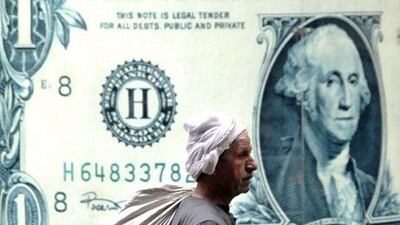Egypt could be back to the drawing board on austerity measures linked to a critical US$4.8 billion (Dh17.63bn) loan package from the IMF, as the government yesterday indicated that it would need to re-examine the conditions attached to the release of the funds.
"We invited another mission of the IMF to again realign the programme so we can move forward with our national reform programme, to handle the budget deficit, to handle the fiscal problems so we can move forward with growth," the prime minister Hisham Kandil said.
The IMF is seeking reassurances that Egypt's government can push through a fiscal and financial programme that includes tax increases and spending cuts.
Yesterday, Mr Kandil addressed investors at a conference in Cairo, saying that although a programme had been agreed to, it had to be postponed "because of the domestic situation". The government was undergoing a quick-assessment and expected to be on track very soon, he said.
Securing the IMF loan would send a reassuring message to international markets that Egypt was on the path to a sustainable economy.
Discussions had been expected to begin where they left off last month, when violent protests erupted across Cairo to criticise a package of unpopular austerity measures that come as a requirement of the loan. Officials decided at the time to postpone concluding a deal for one month to allow time to explain the loan conditions to the public.
But the latest statements by the prime minister have sparked fears among the investment community of a sustained economic crisis including the collapse of Egypt's currency amid a rapid depletion in foreign currency reserves if the IMF loan is postponed further.
"The government needs a new plan given the uncertainty and how things have drastically changed over the course of two months," said Wafik Dawood, the head of institutional trading at Mega Investment Securities in Cairo.
"They will have to submit new economic plans in line with the economic reality. Much has changed in terms of the currency and political stability."
Egyptians have rushed to buy US dollars in the last two months, causing the pound to fall to record lows amid fears of a bigger depreciation in the currency.
The pound weakened further to 6.5423 to the dollar yesterday, breaking its previous record of 6.52121 on Wednesday.
Foreign reserves fell to $15bn last month, just enough to cover the cost of three months of imports, considered a "critical minimum" by bankers.
The currency slump has fuelled worries about Egypt's financial health. Last week, it emerged that a $2bn financial lifeline from Qatar appeared to have been used up to support the pound.
"It is worrying," Mr Dawood said. "There are still too many uncertainties regarding the IMF loan. Most people within the industry think Egypt will get the loan, but its just about the time factor."
Egypt's benchmark slipped TK per cent yesterday, amid profit-taking by investors, to close at TK. The EGX 30 Index is up more than 4 per cent since the start of the year. It rallied more than 40 per cent last year, ranking it among the top performing markets globally.
Egyptian authorities have pledged that the loan will be disbursed before April, when the country's parliamentary elections are expected to take place.
"Equity markets are likely to be impacted if statements indicate that an agreement will not be reached before April," Mr Dawood said.
* with Reuters

